- Home
- Chris Wraight
Two Metaphysical Blades Page 2
Two Metaphysical Blades Read online
Page 2
As the light bleeds from the faltering corpse of the Crusade, both spears fall into disuse. In Russ’ case, this is no change from before. He goes to war with his death world’s own frost-forged blades, reaping a path of cold destruction and taking on steadily more catastrophic encounters in what must appear to his many enemies to be either hubris or madness. Not once during this does he reach for the weapon he calls, with considerable ambivalence, ‘the Emperor’s blade’. Not once does he listen to the voices whispering around its rune-carved edge, nor find his fingers creeping closer to its leather-bound casing.
Not, that is, until the very end of his participation in the grand drama, where he goes willingly into the final confrontation he knows he can never win, and only at this point heeds Valdor’s injunction to listen to his weapon. That road will leave him half-dead and bone-crushed on the killing fields of Yarant, where the hateful shaft will once more be taken from his unfeeling fingers.
As for Valdor himself, the Apollonian Spear is also never used during the great defeat in the xenos-haunted tunnels under Terra’s besieged heart. The captain-general does not prosecute that campaign, but remains within the physical Palace with the other lords of war. Perhaps that is for the best – its prophecies would be tokens of madness in those shifting and subtle dimensions. Only when the leaguer is completed and the Throneworld seized in the throttle-grip of the Traitor does he take up the truth-telling spear once more, and know it will soon be gagging on the blood it is forced to spill.
On the night before the commencement of this final act, as he stands on the battlements of the Palace and the sky is dark with corposant-hulled landers, he feels the spirit of the witch-veined weapon stir.
What stories will you tell me, now?+ he sends it, in a rare flight of whimsy.
It does not reply. It is the Apollonian Spear. It only speaks when killing.
And now Terra is burned again. It is all gone, all cold, the flames extinguished. The skies are smothered, the earth is black. A continent-sized fortress stands in ruins, its living occupants in psychic shock, its guns silent. Ash falls across the globe in soft-whispered rain, the last time anything will fall from Terra’s clouds.
Who can tally the loss that was incurred here? It is a task never to be performed, no matter how many adepts of a numerically obsessive Imperium attempt to catalogue the destruction. A new age has been birthed, one that will last ten thousand years before its eventual expiry, a staggering, limping age that will see the last vigour of the Crusade damped down and stamped out, an age of forgetting and smothering.
War will never cease from that point, not truly, but on Terra itself, a shocked silence descends. For a strange and short interval, like a caught breath after trauma, the world holds itself static. The surviving Titans are like haze-wreathed statues on the grey horizon. Fighting men and women stand, their arms slack by their sides, their dull eyes staring at the falling ash.
It is into this world that the Wolf King returns at last, too late to influence the outcome yet too early to escape it. It is his surviving Grey Hunters who stalk through the echoing corridors and banish the last of the ghosts from the still-hot stone. Even the primarchs are humbled by what has taken place. They no longer strut, not like they did on Ullanor seven years before. They are diminished, the ones who survive.
Valdor finds him in a place that was designed as an observatory but will become, over a thousand painful years, of all things, a chapel.
‘Your brother is looking for you,’ he says. He means the Lion, who has come back, also too late, and who now rages through the corridors, lost in a storm of grief and madness.
Russ looks up. His mane is matted, his fangs look blunt. When he smiles, it is gruesome, a wrenching of flesh once ruddy and apt to genuine mirth. ‘Still carrying that damned thing,’ he observes.
Valdor does not know if he can ever let go of it. His fingers have been clamped around the grip for so long that they are hard to prise open. The illuminations still echo in his mind, thousands of them. He has killed thousands.
I am battle-brother Skarr-Hei of the World Eaters. My imperfection is my doubt.
I am Sharro of the Open Hand cult. My imperfection is my fear.
I am the daemon Bilebringer. My imperfection is my name alone.
‘Where is yours?’ Valdor asks. His voice cracks with fatigue. Even for him, this has been like a lingering death. He cannot forget what he saw on the Vengeful Spirit, nor what was lost on those Neverborn-infused decks.
Russ snorts. ‘I told you I never used it.’
‘I gave it to you myself. Here. Before you left.’
‘And it did what you told me it would.’ Russ looks straight at Valdor. ‘Only, my blade illuminates those it strikes, not the hand that carries it. Did that achieve anything? I don’t know. I never will, now.’
Valdor lowers himself, crouching on cramp-stiff muscles. ‘Nothing He did was without purpose. A seed may flower many centuries from its planting. I have seen it myself.’
Russ looked sour. ‘You never stop,’ he muttered. ‘Even now, even here, you’re still spouting these platitudes.’
‘Do not be so hasty to write off His–’
‘He’s dead, Constantin!’ Russ roared, finally rousing himself and shaking the dust from his pelt. ‘All the plans are dead too. We’ve pissed like dogs all over them and now the galaxy stinks from our spoor. Look around you. Try to see this world as those with a soul see it. Try, just for a moment, to be angry.’
Valdor does try. He indulges the Lord of Fenris, and tries. All he hears, though, are the voices of the slain. ‘You cannot get rid of it,’ he says, quietly, knowing the danger in such words. ‘Understand this. When you took it up, on Seraphina, it claimed you as much as you claimed it. It will keep coming back. It will follow you through time, for it was made for you and no other. Some things survive. This is one of them.’
Russ’ shoulders slump. He sighs, deeply, and flecks of bloody acid stain his robes. ‘You always did accept your fate,’ he says. ‘But I never could. I thought that was why He made me the way He did. Now I just think we were all tainted, and I don’t know anything anymore.’
For some reason that triggers something in Valdor. As if from the catacombs far below, he hears the echo of a voice that will never speak out loud again.
Flux and stasis.
‘You will not change,’ Valdor says. ‘Neither will I. That cannot be random.’
Russ is no longer listening. ‘The greatest sin on Fenris,’ he murmurs. ‘To fail your jarl.’
And then, Valdor does something so out of character that even he is surprised by it. But then, this is a time of extremity, the moment when one epoch passes to another, and all but the most mechanistic soul cannot fail to be stirred by that.
He places his hand on Russ’ shoulder, and exerts a faint pressure of reassurance.
‘It is not over yet, Wolf King,’ Valdor says, in as empathetic a manner as he has ever managed. ‘There are sagas yet.’
And then, after so much acceleration, the gallop of history sloughs into the mire. A grand unravelling takes place, a retrenchment, followed by the first acts of purposeful forgetting.
War radiates out from burned-out Terra, lurching and limping all the way back to the Eye itself. During that time the allegiances of the Heresy are only solidified – the loyal become more loyal, the traitorous more traitorous, until there are no places of overlap or sympathy and there can only be a hardened hatred between those who once fought alongside one another. The surviving primarchs head back to their own ruined worlds and rebuild, though in shallow parody of what had always been intended. They mend their roofs, and patch their walls, but still the cold wind blows through open rafters.
Legions become Chapters, and the Adeptus Astartes cedes its leadership of the Imperium to mortal High Lords. Henceforth the Space Marines will be a mere sliver of their old strength
, a disparate band of relentless fanatics flung wide across the lukewarm void, clinging to their rituals and oaths even as those lose their sense.
Perhaps, of them all, the Wolves stay closest to what they were. They remain shunned by all others, feared by their enemies and distrusted by their allies. The ignorant think them devils, the learned think them hypocrites, and both are wrong, and right, for the universe has become a place where instinct rubs up against the dead hand of zealotry.
The Fang, the first of the Emperor’s two gifts to Russ, is completed, and rears up amid the endless blizzards in belligerent defiance. New campaigns are launched in the name of the Allfather, and if they are now conducted with greater grimness than before, there is no less commitment. In all this, the storm-grey prows of the Rout’s fleet forever ply the void with their primarch at their head. Russ never uses the spear, just as he promised, though it is often by his side, carried by some other trusted retainer or hung silently in the halls of honour. The skjalds begin to laugh at it, and call it the beaten cur, a rib-proud dog that slinks around the fireside looking for scraps from its uncaring master. Eventually it finds its way to a backwater shrine world named after a dead Wolf Lord, and is left there as if in penance for past sins.
For a while after that, it seems as if things will never change. There will be wars, and there will be losses, but the halls of the Fang will always roar with fire, its master at the high table with his retainers.
Except, on one night, Russ halts in his laughter, and the drinking horn clatters to the tabletop. He freezes, and there is something else in the chamber with them.
He stands.
‘No more!’ he says, and his eyes alone see it, glittering, a slender spectre turning in the Fang’s frigid air even though it is, in reality, light years away on another world.
Listen to what it tells you.
‘There shall come a time, far from now, when the Chapter itself is dying,’ says Leman Russ, finding these words easily, feeling as if they are being given to him. This is the last time he will speak to his sons, and they do not know it yet. Some will even come with him, but not Bjorn, for he was the one who took the spear on Yarant, and thus tangled himself in this ancient weave, and that is something to grieve for, for the Fell-Handed cannot yet be told the truth, and that will wound him deeply.
‘At the end,’ Russ concludes, by now already half dragged away, ‘I will be there. For the final battle. For the Wolftime.’
Valdor looks up. The candles gutter in his chamber, shaken by a cold breeze that has no place in Terra’s humid atmosphere. He looks out of his window and first sees mountains, blue-black against a Fenrisian night. Then they are city spires again, still half in ruins, testament to the Throneworld’s fertile powers of reconstruction.
‘So soon,’ he murmurs. There is much more he would have liked to have done here, for the galaxy is bleeding and everything is in ruins. Rebuilding must be done aright – the surviving tenets of the old Crusade cannot all be allowed to die, and even his Custodians are forgetting so much.
But he cannot tell the Wolf King to do one thing and allow himself to do another. Valdor has always been bound by the laws, even those he made for himself. He rises, reaching for his armour. By the time he leaves, there will be nothing left of him in the chamber – no sign, no message, no cryptic clue.
He slips out unnoticed, for the path has been prepared for a long time, and unlike Russ he takes no companions with him. That, too, is as it should be – he has never been a gregarious soul.
He looks back only once, just as his lander powers up on the platform. The heart of the old Palace is still there, horribly damaged but structurally intact, and within it, buried deep, is the one who made those things in the beginning. For a moment he cannot take his eyes off that sarcophagus, trying to guess whether He knew how this would transpire from the start, or whether, as seems likely, this is a desperate chance set against unthinkable calamity. Once, Valdor half dreaded the appearance of his master’s voice within his mind, knowing that it would be there only to give orders or make demands, but now that it is silent, he misses it. There are many species of solitude, but this, for one such as he, bound inextricably to the one who made him, is among the worst.
‘Only in death,’ he whispers before leaving.
And now, time is almost fully unravelled. Two worlds, both lodged at the exhausted end of history: one at the heart of mankind’s decaying star-empire, its weakness hidden by its rotting magnificence, the other out in the wilderness, feared from primordial myth and with the scars of recent sorcery staining its melting ice floes.
Within each world lies a chamber, and within each chamber lies a blade, forgotten and in shadow. They are both silent now, unlit, unregarded, for there is much to occupy the minds of those who cleave, however imperfectly, to a vision of humanity free of enslavement to horror. One has been used many times by lesser hands, the other has never been touched.
And so, as they have done for millennia, they wait. Metaphysical blades, each the mirror of the other, instruments of illumination for bearer and victim, resting in the darkness, waiting for an owner.
Opposites, as it was once said. In some ways.
About the Author
Chris Wraight is the author of the Horus Heresy novels Scars and The Path of Heaven, the Primarchs novels Leman Russ: The Great Wolf and Jaghatai Khan: Warhawk of Chogoris, the novellas Brotherhood of the Storm and Wolf King, and the audio drama The Sigillite. For Warhammer 40,000 he has written The Lords of Silence, Vaults of Terra: The Carrion Throne, Watchers of the Throne: The Emperor’s Legion, the Space Wolves novels Blood of Asaheim and Stormcaller, and the short story collection Wolves of Fenris, as well as the Space Marine Battles novels Wrath of Iron and War of the Fang. Additionally, he has many Warhammer novels to his name, including the Warhammer Chronicles novel Master of Dragons, which forms part of the War of Vengeance series. Chris lives and works in Bradford-on-Avon, in south-west England.
An extract from Wolfsbane.
Of all the surviving members of Malcador’s Chosen sent to Molech, Garviel Loken was the last to be called to the Wolf King’s presence. Macer Varren and Proximo Tarchon had been summoned first. Ares Voitek had been woken for a while from his healing sleep to attend upon the primarch of the Space Wolves, and the human Rahua revealed reluctantly that even he had been to the Hrafnkel. His reluctance was understandable. A mere human was given such a great honour before Garviel Loken, agent Alpha-Prime of the Knights Errant. Loken was left on Titan and wondering if his lack of summons were a good or a bad thing.
Loken spent the waiting time wisely. There were things to do. There were always things to do, not least submitting to endless interrogations by Malcador’s agents. The questioning was understandable. He had been in the presence of the Warmaster, his gene-father. As the interrogations occupied only a portion of his days, he was permitted to take up his duties between interviews. These occupied a portion more.
He still had too much time on his hands.
The mind of a legionary is capacious, and despite his allotted tasks, there remained plenty of space for doubt: why had he not been brought before Russ?
When the call finally came it was a relief, although he knew there was a chance the meeting could end in his death.
He came from Titan by fast ship to Terra’s orbit. He rode on the command deck all the way, clad in his armour as if he were heading into battle, standing beside the command throne so motionless and stern he seeded disquiet among the small crew.
The ship cut over the plane of the ecliptic. Mars and Terra were in opposition. The lights of the ships blockading the red planet made it seem that there were a dozen worlds attended by a hundred additional moons.
Constant vox-chatter whispered from the comms stations. Sol’s void space was crammed with starships. Activity in the system had reached a fever pitch. Now the warp storms had begun to abate, Dorn antic
ipated Horus would launch an attack soon, and so the home system of mankind prepared feverishly for battle.
Terra appeared as a star at first, a singular albedo shine that split into dozens then hundreds of lesser lights as Loken’s ship approached. Russ’ ships were moored at the high anchor halo of resupply stations and dry docks, where the battered remnants of the VI and V Legions’ once mighty fleets underwent hurried repairs.
Codes were transmitted and received. Without slowing, the cutter headed directly for the largest ship, a Gloriana-class behemoth swaddled in mending frames, closely overlapped like bandages over its wounds.
The Hrafnkel, Leman Russ’ flagship and one of the most powerful vessels in the whole galaxy.
They touched down on the embarkation deck. Loken was away before the engines had finished their cooling cycle.
A clamour of industry roared into the cutter as the gang ramp descended. Clattering metal and machine tool whines and the grinding shrieks of blades cutting into plasteel assaulted Loken’s hearing. The stink of burning metal filled the place end to end, vast though it was. Sparks fountained in arcs like geysers of lava. Sheets of plastek as tall as Titan banners wafted in hot breezes blowing from the ship’s depths. Menials in the heavy environment suits of the Terran Stevedores and Shipwrights Guilds were at work everywhere, aided by barbarous-looking Fenrisian menials who wore primitive leather masks beneath their visors. Loken halted at the base of the cutter’s ramp to avoid a heavy repair rig rumbling down the embarkation deck’s central road. The servitor drivers wired into the cab stared blankly ahead. A group of Mechanicum adepts followed, directing the machine by means of a remote control box implanted into the chest of a vast brute who was linked to the cogitators aboard by a long, flexed umbilicus covered in rubberised plastek.

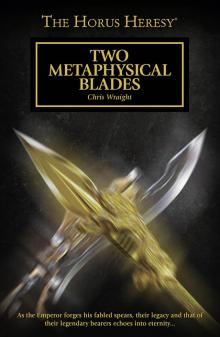 Two Metaphysical Blades
Two Metaphysical Blades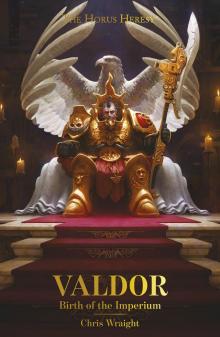 Valdor: Birth of the Imperium
Valdor: Birth of the Imperium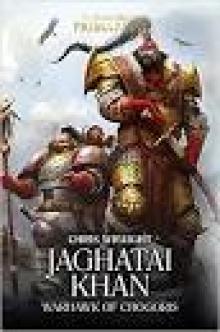 JAGHATAI KHAN WARHAWK OF CHOGORIS
JAGHATAI KHAN WARHAWK OF CHOGORIS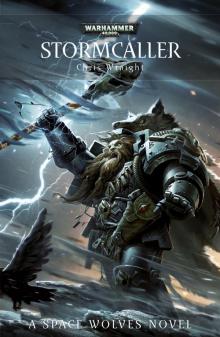 Stormcaller
Stormcaller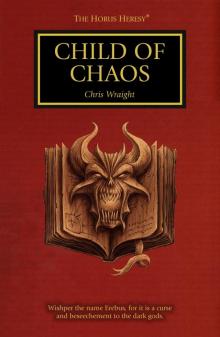 Child of Chaos
Child of Chaos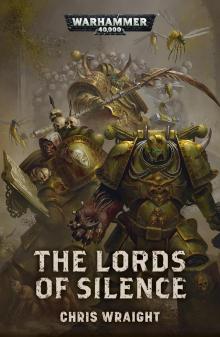 The Lords of Silence
The Lords of Silence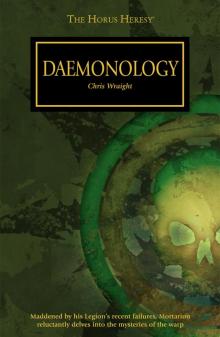 Daemonology
Daemonology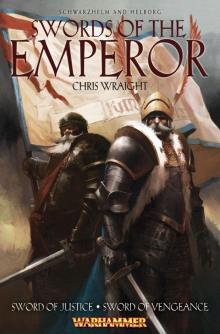 Swords of the Emperor
Swords of the Emperor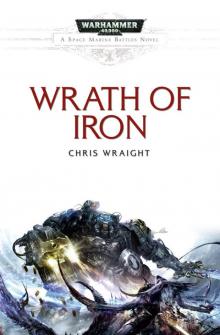 Wrath of Iron
Wrath of Iron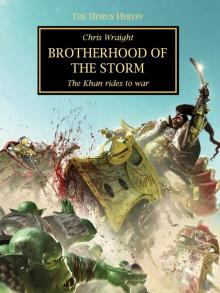 Brothers of the Storm
Brothers of the Storm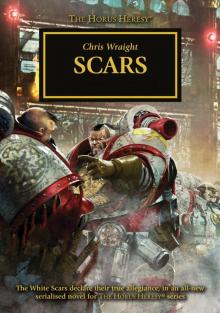 Horus Heresy: Scars
Horus Heresy: Scars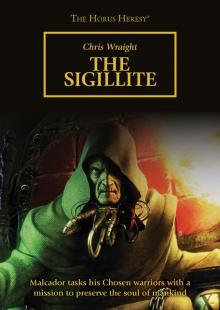 The Sigillite
The Sigillite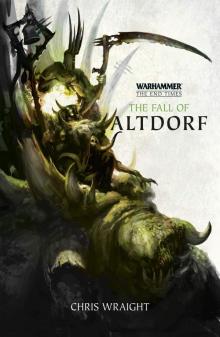 The End Times | The Fall of Altdorf
The End Times | The Fall of Altdorf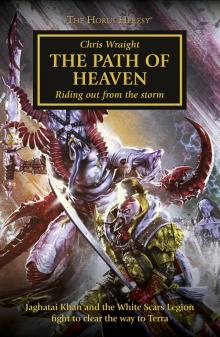 The Path of Heaven
The Path of Heaven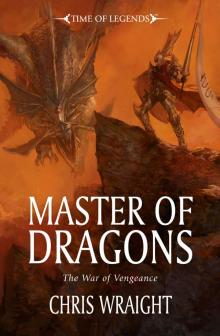 Master of Dragons
Master of Dragons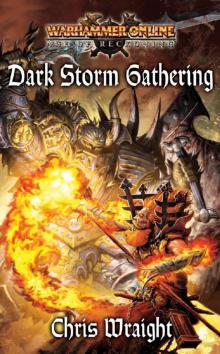 WH-Warhammer Online-Age of Reckoning 02(R)-Dark Storm Gathering
WH-Warhammer Online-Age of Reckoning 02(R)-Dark Storm Gathering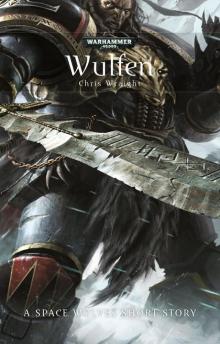 Wulfen
Wulfen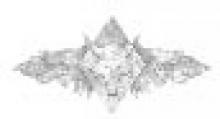 Battle Of The Fang
Battle Of The Fang Onyx
Onyx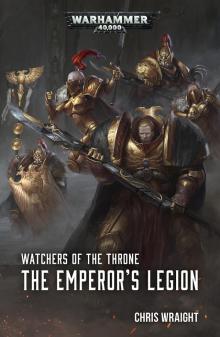 Watchers of the Throne: The Emperor’s Legion
Watchers of the Throne: The Emperor’s Legion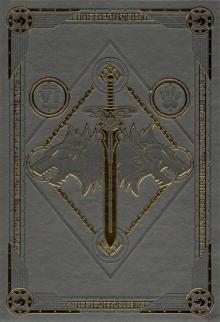 Leman Russ: The Great Wolf
Leman Russ: The Great Wolf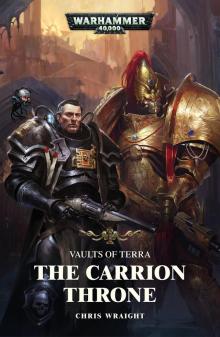 Vaults of Terra: The Carrion Throne
Vaults of Terra: The Carrion Throne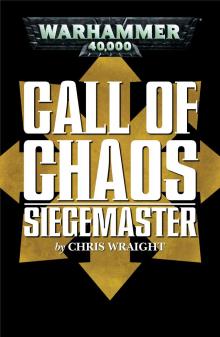 Siegemaster
Siegemaster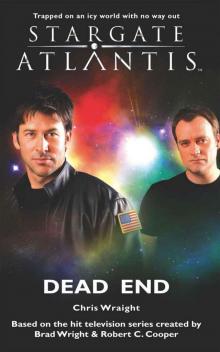 STARGATE ATLANTIS: Dead End
STARGATE ATLANTIS: Dead End Scars
Scars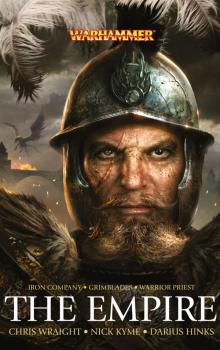 The Empire Omnibus
The Empire Omnibus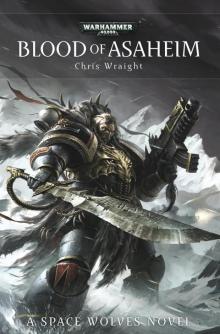 Blood of Asaheim
Blood of Asaheim